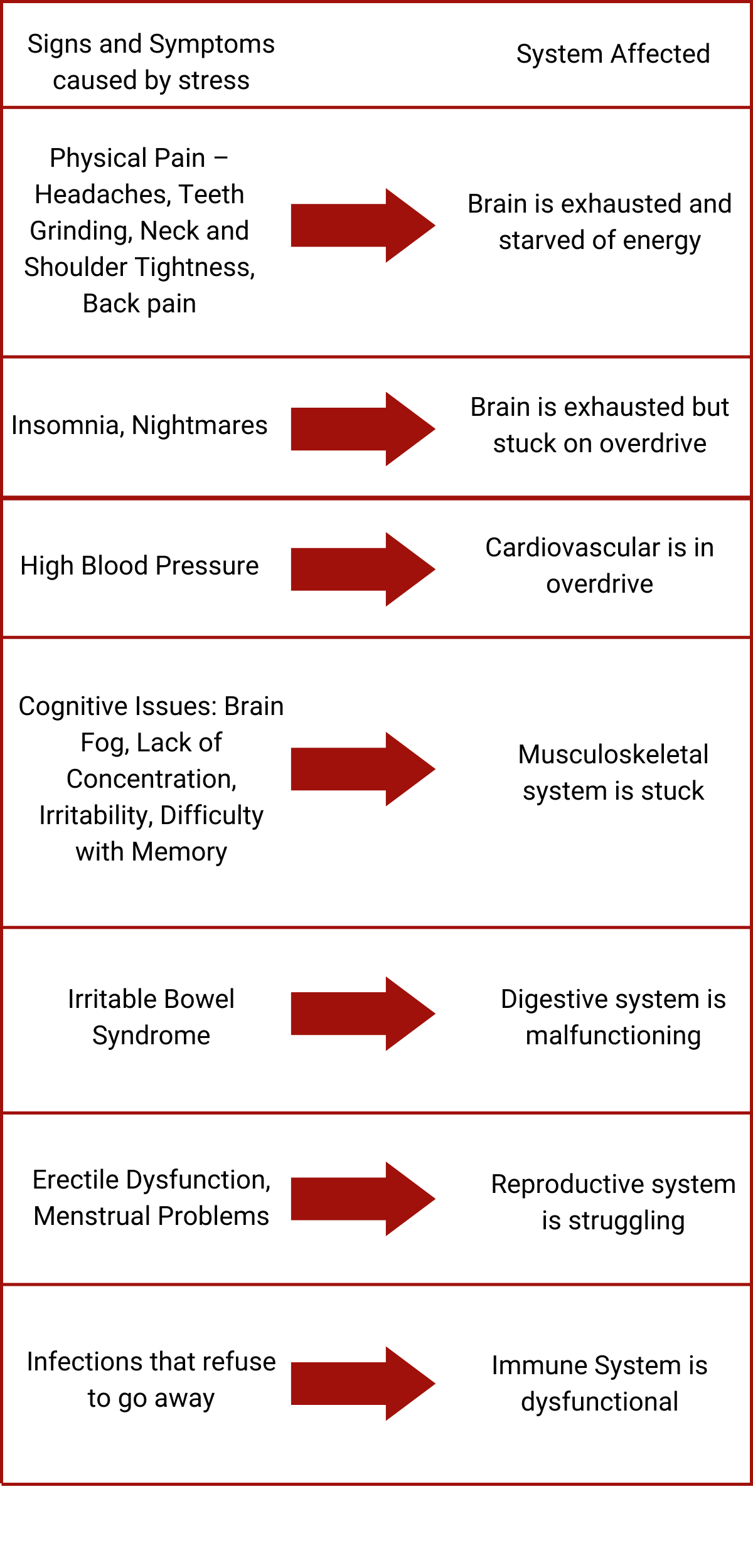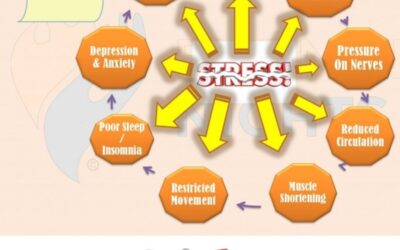Stress Management
What is Stress? What is its function? Is it good or bad?
The Stress response is the body’s response to an emergency, only to be used sparingly. Animals in the wild use it effectively – once the zebra is out of its predator’s reach, it settles down and the Stress response switches off, normality returns.
Stress is neither good nor bad, it is our response to it that determines whether it damages us because stress affects every system in our body.
Humans can create emotions purely through thought alone. Unfortunately, relentless Stress has become a major modern illness. Stress impacts every system in your body, some increase in activity, others stop working. If you are a zebra being chased by a lion, you don’t want to waste energy digesting food, killing germs in your body or thinking of reproduction. These are some of the systems that shut down whilst others, like your heart, lungs, musculoskeletal system, all get turbocharged to fulfil the demands on your body. This is how our systems prepare us to either fight or take flight – it helps us stay alive.
How are Stress and Pain Related?
How Can I Help?
Stress…
….is the major modern illness. It affects every system in your body, creating huge imbalances and unless these imbalances are addressed, illness and disease follow.
The usual approach of simply treating symptoms – e.g. b-blockers for high blood pressure; steroids for asthma; antibiotics for infections; co-codamol and ibuprofen for physical aches and pains; anti depressants and anti-epileptic drugs for migraines and other headaches – provides temporary relief and sometimes makes matters worse because the drugs interact and create additional issues. This is not the answer.
Stress treatment requires a wiser approach.
This is where the FiXme Way comes in – an integrated multi-modal approach, where the WHOLE of you is treated and not just your symptoms.
This will give you long-lasting results, reduce dependency and finally, free you from being a Prisoner to your Pain.
Sounds interesting…?
I offer a FREE Discovery Call, book now to free yourself from the prison of pain…

Clinical Hypnotherapy
Clinical Hypnotherapy is a much maligned technique. Used wisely and in the hands of a skilled practitioner, this can yield astounding results for anxiety, stress, trauma including PTSD, depression to name just a few conditions.
Hypnotherapy is not the same as hypno-sensationalism such as seen on the media – you won’t be asked to ‘perform’ as a monkey, nor will you be asked to behave contrary to your values.
Hypnotherapy is a way to access your Unconscious mind to find solutions to your problems. The FiXme Way follows Milton Erickson’s Utilization approach, which means that at no point in time will you be controlled or forced into paths that are not beneficial to you. From the detailed consultation that precedes treatment, we will determine what you need and decide the way forward, e.g. we might feel you need to access resources that have become buried or perhaps look for causes of the presenting difficulties. The practice of self hypnosis forms a central part of the treatment protocol, and simple techniques such as anchoring are used. For deeper longer held traumas e.g. PTSD, PARTS therapy provides good results.
PLEASE BE ASSURED: Whatever path is decided upon, it will be with your full consent. The essence of hypnotherapy can be described as follows: we will communicate with the Unconscious mind whilst your Conscious mind will remain quiet but remain fully aware of all that is going on and capable of interjecting at any point.
How can I manage my Stress?
If you experience any of the symptoms above, then you need help managing stress.
The Power Of Mindfulness
Everyone is talking about Mindfulness – companies such as Google and Yahoo have made it part of their employee Wellness Programme. So what is its charm?
Mindfulness is a great Stress Management tool, simple and effective and desperately needed in our chaotic demand riddled lives. Essentially, Mindfulness is about keeping attention focused on the present moment instead of allowing our minds to fantasize about the future or regret the past. It temporarily gets us off the hamster wheel of our mind and helps us regain some calm, like sitting on the beach, quietly watching the waves. As Dr Charles Tart, an American Psychologist specializing in Consciousness, says in his excellent book Mind Science – ‘we are all ‘thoughtaholics’ and practising Mindfulness is our version of the AA’.
Mindfulness is over 2500 years old and forms the central practice in Buddhism but don’t worry, you don’t need to be a believer to use it.
It was in the 1980s that Jon Kabat Zinn a molecular biologist and a life long practitioner of Mindfulness devised a programme to help patients manage their Pain and Stress using Mindfulness. Since then MBSR & MBCT have become known world wide and are being used extensively to treat chronic problems, including Pain, Stress & Depression.
At FiXme, Mindfulness forms an essential part of your treatment programme and again, there is no cause for concern because you will be fully supported in developing this technique.
How It Works
Anxiety
Anxiety is a normal human emotion – many people feel anxious, or nervous, when faced with a problem at work, before taking a test, or making an important decision. Most of the time, this is manageable and passes after the event.
However, when this anxiety presents in damaging ways such as relationship break down, inability to manage one’s emotions, being tearful, drinking/eating more, insomnia, this signals a deeper underlying issue. One of the main sources of anxiety, emotional breakdown and other mental health problems in adult life stems from emotional neglect/trauma in childhood
Types of Anxiety Disorders
- Panic Disorder – suddenly feeling terrified; sweating, chest pains (may make the sufferer feel they are having a heart attack); difficulty breathing
- Social Anxiety Disorder (Social Phobia) – over worrying about what others may think of us; of being judged and ridiculed
- Phobias – an intense, irrational, uncontrollable fear of objects e.g spiders, snakes, water; leads to avoidance which causes anxiety which then feeds into the phobia – a horrible cycle
- Generalized Anxiety Disorder – excessive, unrealistic worry and tension, sometimes about the smallest of things, or perhaps about nothing at all
Common symptoms include:
- Feelings of panic, fear, and uneasiness
- Problems sleeping
- Cold or sweaty hands and/or feet
- Shortness of breath
- Heart palpitations
- An inability to be still and calm
- Dry mouth
- Numbness or tingling in the hands or feet
- Nausea
- Muscle tension
- Dizziness
If you are suffering from any of the above, please do give us a ring – we can help you deal with them…
Insomnia
…is not uncommon. Most people will, at some point in time, experience problems sleeping. Up to about 30% of people in the UK have regular episodes of insomnia, and it tends to be more common in women.
Insomnia can present as difficulty getting to sleep or waking in the night and then not being able to go back to sleep. For sufferers, this becomes a concern because they can’t feel rested and refreshed the next morning, even though they’ve had enough opportunity to sleep.
Of course, no two people need the same amount of sleep – age, lifestyle, personality, all play a part in determining the amount of sleep you need.
The most common symptoms of insomnia are:
- difficulty falling asleep
- waking up during the night
- waking up early in the morning
- feeling irritable and tired and finding it difficult to function during the day
What causes insomnia?
Stress, anxiety and excessive use of technology are the most common causes of insomnia, but it can also be caused by some other conditions such as depression, some medications and alcohol.
How does one deal with insomnia?
A good SLEEP ROUTINE is essential to getting a decent night’s sleep.
Here are some simple but effective strategies:
- Go to bed at a regular time
- Have a warm bath if you enjoy one; add a candle and some music if that helps
- A warm drink (not alcohol) can also be soothing
- Do NOT check the news, Facebook posts or any gossip on your mobile phone at least 1 hour before you plan to go to bed. The blue light is not conducive to sleep as I recently have experienced. So I am now forced to wait till the morning to check on results of the Australian Open. That’s OK, I will live and get a decent night’s sleep in the bargain.
- Keep the bedroom free of television sets and radios – this is contentious because a lot of people listen to various podcasts before bedtime. This is exactly what we are trying to avoid, being dependent and/or connected with external stimuli at bedtime
- Use a wonderfully scented moisturizer and take your time applying this all over and stay focused on this task, really enjoying the experience. The chattering monkeys in our heads are the main reason why we stay awake. Connecting with your body will help to disconnect from your mind.
- Invest in some lovely luxurious (or comfy) nightwear – snuggling into these will start conditioning your mind to realizing it’s time for slumber
- Finally, try some Mindfulness meditation, especially the body scan which will help you to reconnect with your body and disconnect from your mind
If you are new to Mindfulness and would like to try it without obligation, then join us for our FREE Mindfulness Practice Sessions, held twice a month in Lower Earley. You will be sure to receive a warm welcome.
If these simple strategies don’t work, then please do get in touch and I will be happy to help further.
Book a Discovery Call
Contact me if you feel overwhelmed with stress. We will have a free 20-minute Discovery Call.
Identify The Issues
We will have an honest conversation, identifying what we need to look at and resolve. From here we then schedule in sessions which best suits your calendar.
Stress Mangement
Learn to manage stress and limit the symptoms caused by stress.
What Our Clients Say
Stress management Posts
How to Reduce Stress and Anxiety with Interior Design
After a hard day, can you relax and re-energise once you close your front door? If the answer is...
Are you missing signs of being stressed? Here is what happened to me…
Are you missing signs of being Stressed? Here is what happened to me…. As a Pain and Stress...
Proof: Stress/Anxiety causes Pain
My mum is in her 90th year For a while she has been complaining of jaw pain with ‘sudden onset’. ...



